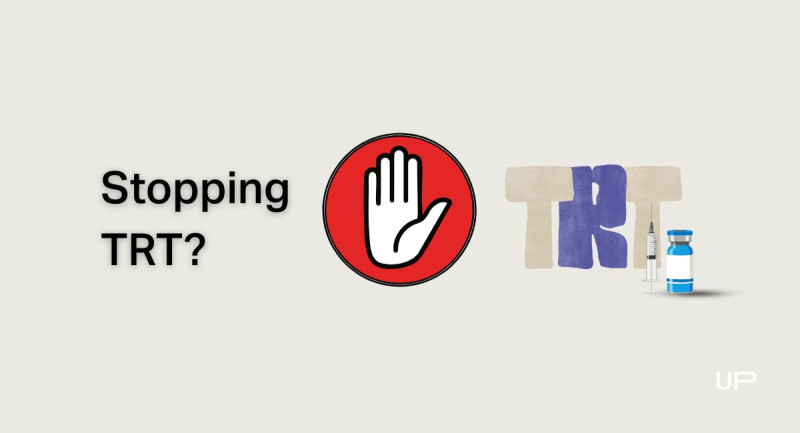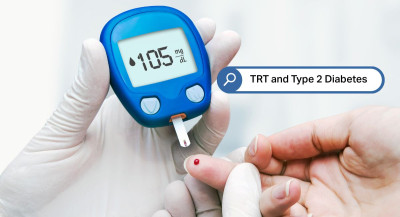Stopping TRT: What Happens When You Come Off Testosterone


For men undergoing testosterone replacement therapy (TRT) in Canada, the thought of stopping can bring up more questions than answers.

Whether it’s due to changing health goals, side effects, cost, or lifestyle changes, coming off TRT is rarely a simple decision.
Many wonder: Will my symptoms return? Will my body start producing testosterone again? What will the process feel like? These are valid concerns, especially for men who’ve relied on TRT to manage low energy, mood changes, and sexual health.
This article breaks down what really happens when you stop TRT, why proper medical supervision matters, and how to make the transition as smooth and safe as possible.
Topics covered in this article:
- How TRT Affects Natural Hormone Production
- What Happens Immediately After Stopping
- Longer‑Term Effects of Ceasing TRT
- Withdrawal, Dependence and “Crash” Risk
- How Recovery Works: Restarting Hormone Production
- Post-TRT Alternatives and Recovery Plans
- When Natural Recovery Doesn’t Happen
- UPGUYS Support for Men Considering Stopping TRT
- FAQs – Stopping TRT: What Men Want to Know
- Conclusion – Stopping TRT? Know the Risks, Plan the Path
- References
How TRT Affects Natural Hormone Production
When you take exogenous testosterone (i.e. TRT), it can significantly suppress your body’s own hormone regulation through an internal feedback loop. Here’s what happens:

- The hypothalamus senses higher levels of testosterone and reduces its release of gonadotropin‑releasing hormone (GnRH).
- With less GnRH stimulation, the pituitary gland lowers its secretion of luteinizing hormone (LH) and follicle‑stimulating hormone (FSH).
- LH normally signals the Leydig cells in the testes to produce testosterone naturally. With LH suppressed, your testes make less or no testosterone.
- This suppression is sometimes referred to as hypothalamic‑pituitary‑gonadal (HPG) axis shutdown.
- Because intratesticular testosterone is essential for spermatogenesis, this mechanism also reduces sperm production TRT, in effect, acts like a contraceptive in many men.
- Elevated estrogen (a byproduct of testosterone conversion) can further reinforce suppression of LH and FSH through negative feedback.
In short, once you stop providing external testosterone, your body needs to restart that hormone cascade. That’s why discontinuing TRT might lead to a period of low hormonal levels until the HPG axis “reboots,” assuming it’s still functional.
What Happens Immediately After Stopping
When a man discontinues testosterone replacement therapy, several short‑term hormonal and symptom changes tend to occur as the body adapts to the sudden lack of exogenous testosterone. The timeline and intensity of these changes vary based on factors like dosage, duration of TRT, and individual physiology.
Key short‑term effects to expect:
- Rapid hormone drop: Without external testosterone, serum levels begin to decline. Because the body’s own production is suppressed (as covered earlier), there is often a delay before endogenous production ramps up again.
- Return of symptoms: Fatigue, low libido, mood swings, and reduced motivation tend to reappear — sometimes more intensely than before starting TRT. Many men report a “crash” experience.
- Mood and mental effects: Irritability, depression, or anxiety may surface or worsen temporarily as testosterone falls. Some sources even cite “withdrawal”‑like symptoms in men discontinuing TRT.
- Muscle and strength loss: The gains in muscle mass and strength achieved on TRT may begin reversing fairly quickly without hormonal support and continued training.
- Sexual function changes: Erectile function, morning erections, and overall sexual desire often decline, sometimes rapidly, as hormonal levels fall.
- Fluid or weight changes, estrogen shifts: Some men notice changes in water retention or a relative rise in estrogen’s effects due to changing hormone balance.
These effects don’t necessarily all happen at once, and the severity will depend on how long and how strongly the TRT suppressed natural production. Careful medical oversight can help manage — or in some cases blunt — the most uncomfortable transitions.

Longer‑Term Effects of Ceasing TRT
After the initial hormonal drop and acute symptoms, men stopping testosterone replacement therapy (TRT) in Canada often wonder what happens in the long run. The body may recover — but not always fully or quickly, and some effects of low testosterone may return or persist.
Here’s what the longer-term picture may look like:
- Muscle loss and strength decline: Without the anabolic support of testosterone, muscle mass and strength may gradually diminish, especially if exercise habits and nutrition are not maintained. The rate of loss varies but can be noticeable over several months.
- Bone density concerns: Testosterone supports bone health. Prolonged low T can increase the risk of osteoporosis, especially in older men. Without TRT, bone mineral density may decrease over time, particularly if levels stay low without medical intervention.
- Reduced libido and sexual function: Some men experience a sustained drop in sex drive and fewer spontaneous or morning erections. This isn’t guaranteed, but it's more likely if testosterone levels remain suppressed or low after discontinuation.
- Mood and cognitive effects: Low testosterone is associated with depression, irritability, poor motivation, and brain fog. While some men adjust over time, others may continue to experience mood fluctuations unless hormone levels normalize or other treatments are initiated.
- Uncertain natural recovery: In some cases, the body resumes normal testosterone production after TRT is stopped — especially if the therapy was short-term. However, for others, especially those on long-term or higher-dose treatment, natural production may not fully recover. Recovery can take several months and may require assistance through medications like hCG or clomiphene citrate, under medical supervision.
Important: Long-term effects aren’t just about symptoms. Ongoing low testosterone levels have been linked to increased risks of cardiovascular disease, insulin resistance, and decreased quality of life. That’s why post-TRT recovery should always be monitored with follow-up testing and healthcare support.
Withdrawal, Dependence and “Crash” Risk
Stopping testosterone replacement therapy (TRT) is not the same as quitting recreational steroids, but that doesn’t mean it’s symptom-free. While TRT does not cause chemical dependence in the addictive sense, many men experience what’s commonly referred to as a “crash” once their treatment ends.
This crash is not withdrawal in the drug abuse sense but rather a hormonal recalibration. Here’s what that might look like:
- Physical symptoms: Fatigue, decreased strength, poor sleep, joint pain, and reduced libido are common after stopping TRT. These symptoms stem from low or fluctuating testosterone levels as your body attempts to resume its own production.
- Mental and emotional effects: Anxiety, low mood, irritability, and brain fog may resurface or intensify. This is often the most distressing part for men who felt mentally sharp and emotionally balanced while on TRT.
- “Crash” timeline: Symptoms can appear within days or weeks after the last dose, peaking as testosterone levels fall and the body has not yet restarted natural production. For some, this lasts weeks. For others, especially those who were on TRT long-term, symptoms can persist for months.
- Not true dependence: It’s important to clarify: TRT does not cause addiction or drug-seeking behaviour. The difficulty lies in the body’s temporary hormonal imbalance — not in psychological dependency.
- Who’s most affected: Men who stop TRT abruptly, without medical guidance or post-treatment planning, are more likely to experience a severe crash. Tapering off slowly or using supportive medications (like hCG or clomiphene) under doctor supervision can help minimize this.
Bottom line: The "crash" after TRT is real but manageable. It’s the result of hormonal suppression, not drug addiction, and it reinforces why stopping TRT should always involve medical oversight and a personalized plan.
How Recovery Works: Restarting Hormone Production
When a man stops testosterone replacement therapy (TRT), the body has to restart its natural hormone production. This process doesn’t happen instantly. It depends on a few key hormonal signals and the overall health of the reproductive system.
Here’s what needs to happen:
- Luteinizing hormone (LH) and follicle-stimulating hormone (FSH) need to return to normal levels. These are the pituitary hormones that tell your testicles to produce testosterone and sperm.
- Testicular function must be intact. If your testicles are healthy and responsive, recovery is much more likely.
- The hypothalamic-pituitary-gonadal (HPG) axis must kick back in. This hormonal feedback loop can remain suppressed for weeks or months after stopping TRT.
Recovery timelines vary by individual. Some men may see testosterone production start to rebound within a few weeks. Others, especially those who used TRT for years or had low baseline testosterone to begin with, may take several months or longer to recover fully.
Factors that affect recovery:
- Age
- Duration of TRT use
- Dosage and formulation used
- Baseline testosterone levels before TRT
- Overall health and lifestyle
In some cases, recovery can be supported with medications like hCG (human chorionic gonadotropin) or clomiphene citrate. These are sometimes used in post-TRT protocols to help restart the natural production of testosterone.
The best outcomes happen when men work closely with a doctor throughout the process, rather than stopping treatment abruptly and waiting to “feel normal” again on their own.

Post-TRT Alternatives and Recovery Plans
Coming off testosterone replacement therapy (TRT) doesn’t mean you’re out of options. For many men in Canada, there are safe and structured paths to recovery — and in some cases, effective alternatives to help restore hormonal balance without restarting TRT.
Here are a few medical and lifestyle tools doctors may use:
- Clomiphene citrate (Clomid): A selective estrogen receptor modulator (SERM) that encourages your body to produce more of its own testosterone by stimulating the release of LH and FSH.
- hCG (human chorionic gonadotropin): Mimics LH, signaling the testes to resume testosterone production and maintain testicular volume.
- Lifestyle changes: Prioritizing sleep, weight loss, regular exercise, and stress management can help improve natural testosterone production over time.
- Nutritional support: Ensuring adequate intake of vitamin D, zinc, magnesium, and healthy fats can support hormonal function during recovery.
It’s important to note that recovery isn’t always quick or guaranteed. Some men may recover fully, while others may continue to experience low testosterone symptoms and choose to resume TRT under medical supervision. Working with a licensed provider who understands both the risks and the recovery options is key to managing this transition effectively.
When Natural Recovery Doesn’t Happen
For some men, testosterone production may not bounce back after stopping TRT — even with time, lifestyle changes, or medical support. This is more likely when therapy has been long-term, started later in life, or if there were underlying issues with hormone production before starting treatment.
Signs that natural recovery isn’t occurring may include:
- Ongoing fatigue or low energy
- Persistently low libido or erectile dysfunction
- Mood swings, low motivation, or brain fog
- Loss of muscle mass and increased body fat
If symptoms persist beyond 6 to 12 months after stopping TRT, doctors may re-test hormone levels and reassess treatment options. In some cases, restarting TRT under close supervision is the most practical solution to maintain quality of life.
The key is not to guess or wait indefinitely. Regular lab testing and open conversations with a licensed healthcare provider in Canada can guide your next step — whether that’s staying off TRT or carefully reintroducing it.
UPGUYS Support for Men Considering Stopping TRT
If you're thinking about stopping testosterone replacement therapy (TRT) in Canada, you're not alone, and you don’t have to figure it out on your own. UPGUYS provides access to licensed Canadian doctors who can guide you through your options based on your health, symptoms, and goals.

Our approach puts your well-being first. Whether you’re weighing the pros and cons of staying on TRT, looking to step away from it, or just want clarity on what to expect, our medical team is here to listen and provide informed, judgment-free advice.
The most important thing? You don’t need to guess. With proper medical oversight and support, it’s possible to make confident, healthy decisions about your hormone health at every stage.
FAQs – Stopping TRT: What Men Want to Know
Possibly. Stopping TRT abruptly can cause testosterone levels to drop quickly, leading to symptoms like fatigue, low mood, or decreased libido. It’s best to speak with a healthcare provider before making changes.
Yes, in many cases. However, recovery depends on your age, health, length of TRT use, and individual hormone function. Some men may bounce back in a few months, while others might need medical support.
Stopping TRT is not inherently dangerous, but doing so without medical supervision can lead to uncomfortable symptoms. A doctor can help you taper safely or offer supportive treatments if needed.
Hormone levels may begin to recover within weeks, but full recovery can take several months. Every man’s timeline is different. Lab testing and symptom monitoring are key during this process.
Possibly. TRT can suppress sperm production, but options like hCG or other therapies may support fertility while maintaining testosterone levels. Always consult a medical professional before making changes.
Conclusion – Stopping TRT? Know the Risks, Plan the Path
Testosterone replacement therapy (TRT) in Canada has helped many men regain energy, mood, and confidence. But deciding to stop—whether because of side effects, changing goals, or fertility plans—can be just as important as starting.
The key is not to guess or go it alone. Hormones are complex, and your body needs time and support to readjust. Whether you’re looking to restart natural production, protect your fertility, or simply take a break, a medically guided plan makes all the difference.
You’re not stuck—and you’re not alone. With expert help, safe options, and a clear understanding of what to expect, you can make the right decision for your long-term health.
References
UPGUYS has strict sourcing guidelines to ensure our content is accurate and current. We rely on peer-reviewed studies, academic research institutions, and medical associations. We strive to use primary sources and refrain from using tertiary references.- Exogenous testosterone replacement therapy versus raising endogenous testosterone levels: current and future prospects, PubMed,
https://pubmed.ncbi.nlm.nih.gov/33615283/ - Testosterone dependence: How real is the risk? Urology Times,
https://www.urologytimes.com/view/testosterone-dependence-how-real-risk - Relationship Between Testosterone and Erectile Dysfunction, PubMed,
https://pmc.ncbi.nlm.nih.gov/articles/PMC1476110/
This article is written for informational purposes only and does not constitute medical advice. The information provided in the articles cannot and should not replace advice from a healthcare professional. Talk to your healthcare provider about any physical or mental health concerns or the risks and benefits of any treatment or medication.





